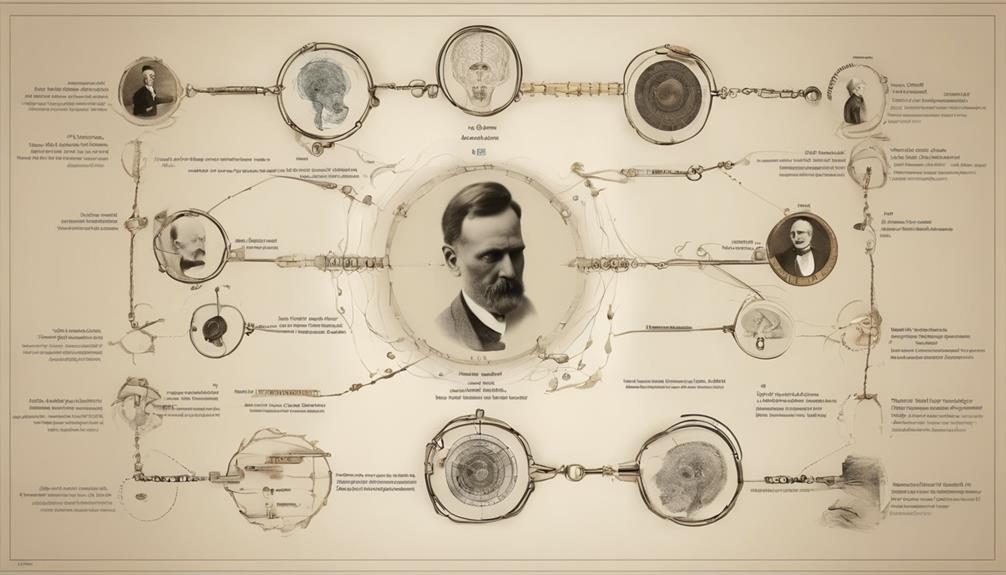Early theories of hypnosis began with Franz Mesmer's concept of animal magnetism, using gestures and passes to induce trance-like states. Jean-Martin Charcot later linked hypnosis to neurosis, viewing it as a tool for studying psychological disorders. Modern perspectives reveal changes in brain activity during hypnosis through neuroimaging studies, influenced by cultural beliefs. Contemporary theories focus on neuroscience uncovering brain mechanisms, increased connectivity, and suggestibility during hypnotic states. Cultural nuances play a crucial role in tailoring hypnosis techniques for therapeutic use. The evolution and history of hypnosis offer a fascinating journey through beliefs, neuroscience, and cultural influences.
Early Theories of Hypnosis

Examining the historical development of hypnosis reveals a range of early theories that sought to explain the phenomenon's underlying mechanisms and effects. One prominent theory was Franz Mesmer's concept of animal magnetism, which he believed to be a fluid that exists in the body and could be manipulated to induce a trance-like state. Mesmer's practices involved gestures and passes to realign this magnetic fluid, leading to what we now recognize as hypnotic induction techniques.
Another significant early theory was developed by Jean-Martin Charcot, who proposed the neurosis theory of hypnosis. Charcot believed that hypnosis was a form of hysteria and that individuals who were susceptible to hypnosis were exhibiting symptoms of neurosis. He used hypnosis as a tool to study and treat various psychological disorders, laying the groundwork for the integration of hypnosis into the field of psychology.
These early theories of hypnosis, including Mesmer's animal magnetism and Charcot's neurosis theory, played a crucial role in shaping our understanding of hypnosis and its applications in both clinical and research settings.
Modern Perspectives on Hypnosis
Modern perspectives on hypnosis encompass a diverse range of theories and approaches that have evolved from early historical understandings of the phenomenon. Recent advancements in neuroscience research have shed light on the underlying mechanisms of hypnosis, suggesting that it involves alterations in brain activity and connectivity. Studies using neuroimaging techniques have revealed changes in neural patterns during hypnotic states, indicating a neurological basis for this phenomenon.
Furthermore, cultural influences play a significant role in shaping modern perspectives on hypnosis. Different societies have varying beliefs and attitudes towards hypnosis, affecting how it is practiced and perceived. For instance, in some cultures, hypnosis is deeply intertwined with spiritual or religious practices, whereas in others, it is predominantly viewed through a scientific lens.
Contemporary Hypnosis Theories

Recent advancements in neuroscience have significantly shaped contemporary theories on hypnosis. Neuroscientific approaches have delved into the brain mechanisms involved in hypnotic states, revealing how various neural pathways and regions are activated during hypnosis. Researchers have identified changes in brain activity, such as increased connectivity between the prefrontal cortex and other brain regions, shedding light on the cognitive processes underlying suggestibility and altered states of consciousness during hypnosis.
Cultural influences have also played a crucial role in shaping contemporary theories of hypnosis. Different cultures view hypnosis through unique lenses, influencing how it is perceived, practiced, and integrated into therapeutic settings. For example, cultural beliefs about the power of suggestion, trance states, and healing rituals can impact the effectiveness of hypnosis interventions. Understanding these cultural nuances is essential for practitioners to tailor hypnosis techniques to diverse populations effectively.
Frequently Asked Questions
Can Hypnosis Be Used for Memory Enhancement?
Hypnosis can potentially aid cognitive performance and learning retention, as it may enhance focus and suggestibility, leading to improved memory encoding and recall. While more research is needed, preliminary studies suggest promising benefits for memory enhancement.
Are There Any Risks or Side Effects of Hypnosis?
When considering the risks and side effects of hypnosis, it is essential to address ethical considerations, potential long-term effects, and therapeutic applications supported by clinical research. Understanding these factors ensures the safe and effective use of hypnosis.
How Does Hypnosis Impact the Brain's Physiology?
Hypnosis impacts brain function by altering neural pathways and inducing various physiological changes. Research suggests it can influence perception, attention, and memory processes. Understanding how hypnosis modulates brain physiology opens avenues for further exploration in cognitive neuroscience.
Can Hypnosis Help With Physical Pain Management?
Hypnosis has shown promise in pain relief by influencing cognitive function. Research suggests it can help manage physical pain by altering perception and response. While individual results may vary, hypnosis offers a potential non-pharmacological approach to pain management.
Is There a Genetic Predisposition to Being Hypnotized?
Research suggests a genetic influence on hypnotizability based on family and twin studies. While individual differences exist, these studies indicate a potential hereditary component in one's susceptibility to hypnosis, shedding light on genetic predispositions.
Conclusion
In conclusion, the evolution and history of hypnosis have been shaped by various theories throughout the years.
From early theories rooted in mysticism and spiritual beliefs to modern perspectives grounded in neuroscience and cognitive psychology, the understanding of hypnosis continues to evolve.
Contemporary theories continue to explore the complex nature of hypnosis and its potential applications in clinical settings, highlighting the importance of ongoing research and exploration in this field.


